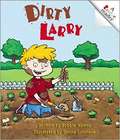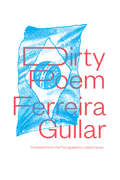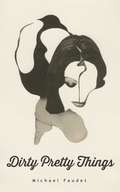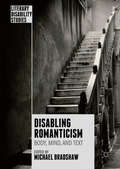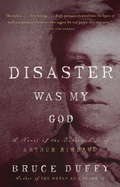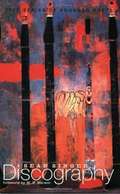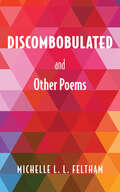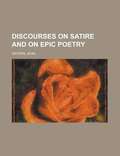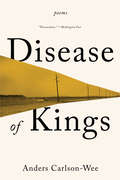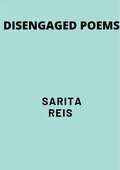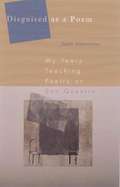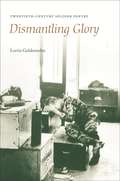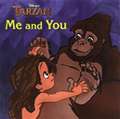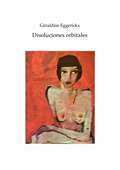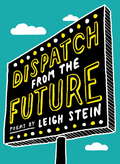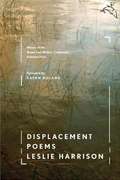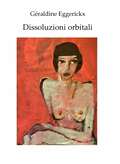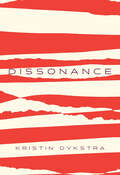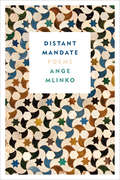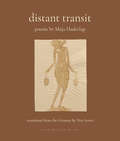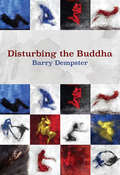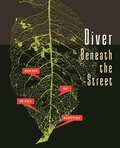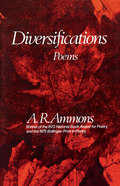- Table View
- List View
Dirty Larry (Fountas & Pinnell LLI Blue #Level D)
by Bobbie HamsaNo matter what he does, Larry always gets dirty—except in the shower.
Dirty Poem
by Leland Guyer Ferreira GullarConsidered the greatest long poem in 20th century Brazilian poetry, Ferreira's Gullar's Dirty Poem was written as a response to the Brazilian dictatorship that put him in exile and murdered thousands. Written in 1975 in Buenos Aires when Ferreira Gullar was in political exile from the Brazilian dictatorship, Dirty Poem is an epic poem that amid life events traces the author's political and artistic evolution and is by most accounts the most important long poem of contemporary Brazilian literature. Scholar and critic Otto Maria Carpeaux wrote: "Dirty Poem deserves to be called 'National Poem' because it embodies all of the experiences, victories, defeats, and hopes in the life of the Brazilian citizen." It is a hypnotic work that draws on the poet's memory of adolescence in the seaside city of Sao Luís do Maranhao during World War II and deals openly with the "dirty" shamefulness of a socio-economic system that abuses its citizens with poverty, sexism, greed, and fear.
Dirty Pretty Things
by Michael Faudet<p>Dirty Pretty Things is the international bestseller by Michael Faudet. A finalist in the 2015 Goodreads Readers Choice Awards, his whimsical and often erotic writing has already captured the hearts and minds of literally thousands of readers from around the world. <p>He paints vivid pictures with intricate words and explores the compelling themes of love, loss, relationships, and sex. All beautifully captured in poetry, prose, quotes, and little short stories. <p>Michael lives in a house by the sea in New Zealand with his girlfriend, international bestselling author, Lang Leav.
Disabling Romanticism (Literary Disability Studies)
by Michael BradshawThis book investigates the presence of disability in British Romantic literature, as subject matter, as metaphorical theme, and as lived experience. It is the first collection of its kind, breaking new ground in re-interpreting key texts and providing a challenging overview of this emerging field. The collection offers both a critique of academic Romantic studies and an affirmation of the responsiveness of the Romantic canon to new stimuli. Authors discussed include William Blake, Lord Byron, Ann Batten Cristall, Samuel Taylor Coleridge, George Darley, Richard Payne Knight, William Gilpin, Mary Robinson, Mary Shelley, Robert Southey, and William Wordsworth.
Disaster Was My God
by Bruce DuffyThe author of the critically acclaimed novel The World as I Found It brilliantly reimagines the scandalous life of the pioneering, proto-punk poet Arthur Rimbaud. Arthur Rimbaud, the enfant terrible of French letters, more than holds his own with Lord Byron and Oscar Wilde in terms of bold writing and salacious interest. In the space of one year--1871--with a handful of startling poems he transformed himself from a teenaged bumpkin into the literary sensation of Paris. He was taken up, then taken in, by the older and married poet Paul Verlaine in a passionate affair. When Rimbaud sought to end it, Verlaine, in a jealous rage, shot him. Shortly thereafter, Rimbaud--just shy of his twentieth birthday--declared himself finished with literature. His resignation notice was his immortal prose poem A Season in Hell. In time, Rimbaud wound up a prosperous trader and arms dealer in Ethiopia. But a cancerous leg forced him to return to France, to the family farm, with his sister and loving but overbearing mother. He died at thirty-seven. Bruce Duffy takes the bare facts of Rimbaud's fascinating existence and brings them vividly to life in a story rich with people, places, and paradox. In this unprecedented work of fictional biography, Duffy conveys, as few ever have, the inner turmoil of this calculating genius of outrage, whose work and untidy life essentially anticipated and created the twentieth century's culture of rebellion. It helps us see why such protean rock figures as Bob Dylan, Jim Morrison, and Patti Smith adopted Rimbaud as their idol.
Discography
by Sean SingerSean Singer's restless, roving demands upon his language, the quick-changes of his invention in search of some provisional rightness, convey through all their metamorphoses an insistent ring of authenticity that seizes the attention and may remind us that the true sense of the word "original" has to do with the origins of a work and of the talent that produced it: with those sources and impulses that are at once individual and universal, unsounded, irreducible and undeniable.
Discombobulated and Other Poems
by Michelle L. L. FelthamThe poems in this engaging collection cover such topics as the seasons, the perils of overindulging during those seasons (as well as at other times), politics, religion, travel, the obvious superiority of cats over mere humans, and the simple, timeless virtues of honesty, sacrifice and charity. No matter the subject, the poet’s sincerity, humour and intriguing view of human nature always shine through.
Discourses on Satire and on Epic Poetry
by John DrydenAn heroic poem (truly such) is undoubtedly the greatest work which the soul of man is capable to perform. The design of it is to form the mind to heroic virtue by example; it is conveyed in verse that it may delight while it instructs. The action of it is always one, entire, and great. The least and most trivial episodes or under- actions which are interwoven in it are parts either necessary or convenient to carry on the main design.
Disease of Kings: Poems
by Anders Carlson-Wee“Provocative.” —Washington Post A vivid chronicle of friendship and loneliness amid the precarity of life in late capitalism, when every day is a fight for survival. In poems bursting with narrative power, Disease of Kings explores the tender yet volatile friendship between two young scammers living off the fat of society. Here are stories of an odd couple who scrounge, con, hustle, and steal, alternately proud of their ability to fabricate a life at the margins and ashamed of their own laziness and greed. Rich with a specificity of voices, these poems locate themselves in a midwestern city at once gritty with reality and achingly anonymous. Here, the central speaker and his best—only—friend, North, come together and apart, nursing a sense of freedom that is fraught with codependence and isolation. With plainspoken language and tremendous tonal range, Anders Carlson-Wee leads us into the heart of one friendship’s uneasy domesticity—a purgatory where, in this poet’s vision, it is possible for loss to give way to hope, lack to fulfillment, shame to gratitude.
Disengaged Poems
by Sarita ReisPoems about human emotions. Many emotions that make part of human being, since most times can be contradictory and indecisive. As much pessimist as optimist. A mosaic of feelings that remains within human heart.
Disguised as a Poem: My Years Teaching Poetry at San Quentin
by Judith TannenbaumMemoir of teaching poetry at a California prison. Includes some of the prisoners' poems.
Dismantling Glory
by Lorrie GoldensohnDismantling Glory deals with the poetry written about the honors and horrors of battle by the very soldiers who put their lives on the line. Focusing on American and English poetry from World Wars I and II and the Vietnam War, Lorrie Goldensohn presents the move from a poetry largely bound to trench warfare to a global war poetry dominated by air power, invasion, and occupation. Civilians, prisoners, and children enter this poetry in new and compelling ways, as do issues of race and gender, changing and complicating the representation of war, and expanding the scope of antiwar thinking.
Dismantling Glory: Twentieth-century Soldier Poetry
by Lorrie GoldensohnDismantling Glory presents the most personal and powerful words ever written about the horrors of battle, by the very soldiers who put their lives on the line. Focusing on American and English poetry from World War I, World War II, and the Vietnam War, Lorrie Goldensohn, a poet and pacifist, affirms that by and large, twentieth-century war poetry is fundamentally antiwar. She examines the changing nature of the war lyric and takes on the literary thinking of two countries separated by their common language.World War I poets such as Wilfred Owen emphasized the role of soldier as victim. By World War II, however, English and American poets, influenced by the leftist politics of W. H. Auden, tended to indict the whole of society, not just its leaders, for militarism. During the Vietnam War, soldier poets accepted themselves as both victims and perpetrators of war's misdeeds, writing a nontraditional, more personally candid war poetry.The book not only discusses the poetry of trench warfare but also shows how the lives of civilians—women and children in particular—entered a global war poetry dominated by air power, invasion, and occupation. Goldensohn argues that World War II blurred the boundaries between battleground and home front, thus bringing women and civilians into war discourse as never before. She discusses the interplay of fascination and disapproval in the texts of twentieth-century war and notes the way in which homage to war hero and victim contends with revulsion at war's horror and waste.In addition to placing the war lyric in literary and historical context, the book discusses in detail individual poets such as Wilfred Owen, W. H. Auden, Keith Douglas, Randall Jarrell, and a group of poets from the Vietnam War, including W. D. Ehrhart, Bruce Weigl, Yusef Komunyakaa, David Huddle, and Doug Anderson.Dismantling Glory is an original and compelling look at the way twentieth-century war poetry posited new relations between masculinity and war, changed and complicated the representation of war, and expanded the scope of antiwar thinking.
Disney's Tarzan Me And You (Me and You)
by Victoria SaxonOne of the most exciting moving aspects of Disney's 37th animated film, Tarzan, is its celebration of the unconditional love between parent and child. Once Kala, Tarzan's adopted gorilla mother, decides to invite the strange-looking child into her heart, we know she will love him forever. Full color. 5 spreads.
Disoluciones orbitales
by Géraldine EggerickxUn entrecruzamiento de tres historias de amor que convergen en una disolución orbital.
Dispatch from the Future
by Leigh Stein"I love these poems." --Joe Dunthorne, author of Submarine. Funny, surprising and lyrical, these poems range from the deserts of the Southwest to the abysses of Facebook. From online dating to beauty pageants, Greek mythology to road trips, Leigh Stein gives us resilient young women in longing and in love. Post-confessional--like Sylvia Plath raised on MTV, or Anne Sexton on Twitter--the poems seduce with a narrative hook or startle with a pop culture reference, all the while wrestling fresh meaning out of our fantasy-saturated modern lives. Leigh Stein's first novel, The Fallback Plan, was hailed as "beautiful, funny, thrilling, and true" by Gary Shteyngart (Super Sad True Love Story). A former New Yorker staffer and frequent contributor to its "Book Bench" blog, Stein is also the author of the poetry chapbook How to Mend a Broken Heart with Vengeance, and is the winner of the Amy Award from Poets & Writers magazine. She lives in Brooklyn.From the Trade Paperback edition.aised on MTV, or Anne Sexton on Twitter, Stein knows how to draw readers in with a narrative hook, or a pop culture reference. This irreverent collection points the way to what contemporary poetry can be.From the Trade Paperback edition.
Displacement
by Leslie Harrison<P>Leslie Harrison's debut collection marks the arrival of an assured new poetic voice. Chosen as the winner of the 2008 Bakeless Prize in poetry by guest judge Eavan Boland, Displacement addresses questions of place and, of course, displacement - from marriage and home - and explores the aftershocks of being uprooted physically and emotionally. <P>Paired with Harrison's natural, keen sense of rhythm, the central themes of impermanence and loss are heightened by the poems' impeccable structure.In a masterful display of formal precision, the collection is filled with "engaging contradictions," says Eavan Boland. <P>In her introduction, Boland writes, "There is a poignancy, poise, and a presence about this book and about its traffic between secrecy and disclosure that allows it to have an unusual force, and a true grip on its reader. This is a real lyric journey; and the reader will take it, too."
Dissoluzioni Orbitali
by Géraldine EggerickxTre brevi racconti d'amore che si intrecciano e si dissolvono in un'unica dissoluzione orbitale. La prima storia è ambientata in Algeria e racconta il dramma esistenziale di Doura, una donna kabyle che confessa il suo passato in punto di morte. Il secondo racconto narra la storia di un tradimento e la terza e ultima parte mostra il punto di vista di due amanti che si dissolvono nella follia del loro amore.
Dissonance (Phoenix Poets)
by Kristin DykstraA collection of poems and photographs that take the foothills of Vermont’s Green Mountains as a microcosm for considering climate change, borders, and community life. In Dissonance, translator Kristin Dykstra’s first book of original poetry, the author leads us to inner worlds shaped partly by the New England countryside, tracking shifts in the region’s nature, infrastructure, and people, while sharing observations on borders and climate catastrophe that reverberate globally. Dykstra condenses signs of urban expansion, economic division, and battles over democracy into an innovative meditation. With a dynamic approach to form, musicality, and scope, Dissonance explores ways of experiencing regional landscapes and imagined communities in the twenty-first century. Through her extended sequence of prose poems, photographs, and lyric fragments, Dykstra merges clips from documents and dialogues with observations drawn from two local libraries and her daily walks down a dirt road through Vermont’s foothills. As she moves down this public road, which lies within the nation’s federally designated hundred-mile border zone, she finds a daily convergence of tensions. Dissonance asks how poetry can unsettle impressions of a place, and how that process, in turn, disturbs impressions of self, of others, and of time itself. Dissonance is the recipient of the third annual Phoenix Emerging Poet Book Prize.
Distance Learning
by Angela SorbyDistance Learning is a vividly visualized and well thought-out book of poetry that carries the reader on journeys through both space and time.
Distant Mandate: Poems
by Ange MlinkoIn Distant Mandate, Ange Mlinko moves between the tormented southern landscape, with its alternately arid and flooded scrublands, and the imaginative landscapes of Western art. Guided by her spiritual forbears—Orpheus, Mallarmé, Pound, Yeats, and others—Mlinko deftly places herself within the tradition of the poet in protest against the obduracy of the real.Mlinko takes the title from a piece by Laszló Krasznahorkai on the unknowable origins of the Alhambra, the monument “for the sight of which there is only a distant mandate . . . [one] can see, in any event, the moment of creation of the world, of course all the while understanding nothing of it.” This distant mandate, also the “bitter ideal” of Mallarmé, is the foundation upon which all works of art are composed—the torment of eros and the intimation of war. Myth is central to these poems; some are based on the story Cupid and Psyche, others serve as odes to Aphrodite or as explorations of the myth of Orpheus and Eurydice. In Distant Mandate, Mlinko has given us a shimmering and vibrant collection, one that shows us not only how literature imagines itself through life but also how life reimagines itself through literature.
Distant Transit: Poems
by Maja HaderlapFrom a groundbreaking Slovenian-Austrian poet comes an evocative, captivating collection on searching for home in a landscape burdened with violent history.At its core, Distant Transit is an ode to survival, building a monument to traditions and lives lost. Infused with movement, Maja Haderlap&’s Distant Transit traverses Slovenia&’s scenic landscape and violent history, searching for a sense of place within its ever-shifting boundaries. Avoiding traditional forms and pronounced rhythms, Haderlap unleashes a flow of evocative, captivating passages whose power lies in their associative richness and precision of expression, vividly conjuring Slovenia&’s natural world––its rolling meadows, snow-capped alps, and sparkling Adriatic coast. Belonging to the Slovene ethnic minority and its inherited, transgenerational trauma, Haderlap explores the burden of history and the prolonged aftershock of conflict––warm, lavish pastoral passages conceal dark memories, and musings on the way language can create and dissolve borders reveal a deep longing for a sense of home.
Disturbing the Buddha
by Barry DempsterDisturbing the Buddha, Barry Dempster's fifteenth collection, is disarmingly conversational and, like the best conversations, it moves between reverence and irreverence, sincerity and irony as it grapples with love, loss, loneliness and simple lack of luck--the "three-leaf clovers" so much more plentiful than the four. Dempster's wit and playful metaphoric turns let us take for granted the courage needed to admit to lif'’s ongoing intensities, disruptions, and indignities. In these poems, a forty-year-old man dons a pink plastic crown on his niece's order; a solitary man watches a Nicole Kidman rom-com with his cat; an aging Aphrodite, more mortal than god, suffers hot flashes. Like the mystic poets he addresses in the book’s final section, Dempster respects the unknown as he comes to terms with the ups and downs of the all-too-human condition. Shifting effortlessly from light-hearted ode to solemn elegy, Dempster offers no touch-up jobs; instead we find a love of the flaw, a generosity toward it even as he exposes it. This is a poetry of inclusiveness, engaging both our better and worse angels, baring its Achilles' heel and trusting us to do likewise.
Diver Beneath the Street (Made in Michigan Writers Series)
by Petra KuppersA decaying psychogeography unfurls the landscapes of the 1967–69 Michigan Murders, the 2019 Detroit serial killer, and the COVID-19 lockdown in this visceral poetry collection. Author, performance artist, and disability culture activist Petra Kuppers dissects traces of violence in the richness of the soil while honoring lost community members. Dynamic and somatic poems traverse the realms of urban space, wild rivers, and the hinterlands of suburbia, glimpsing the decay of bodies, houses, carpets, hair, and bones by way of ecopoetry. Poems like "Reintegration" and "Earth Séance" delve into cycles of decomposition and decreasing biodiversity across the micro- and macroworlds. Others such as "Dancing Princesses" tie timeless fairy-tale tropes of violence toward women to modern murders and lived experience. Moments in lockdown are embodied through somatic exploration of nature and self in works like "Dear White Pine in My Garden." This evocative entanglement of life and death, joy and horror, natural and artificial processes and particles offers an intriguing lyrical and poetic quality as well as unique perspectives through the lenses of feminist, queer, and disability studies.
Diversifications: Poems
by A. R. AmmonsDiversifications is a collection of shorter poems by the poet whose Collected Poems won the National Book Award. The poems are on a diversity of subjects, but through them all runs the strong unity of vision that has led critic Geoffrey Hartman to acclaim Ammons as "a major American poet" (New York Times Book Review). "If his importance was suspected before," wrote the poet John Ashbery in The New York Review of Books, "it is now confirmed." Ammons came late to poetry, and has come even more lately into national recognition. That recognition is solid, however, and can only be increased by this, his latest volume.
